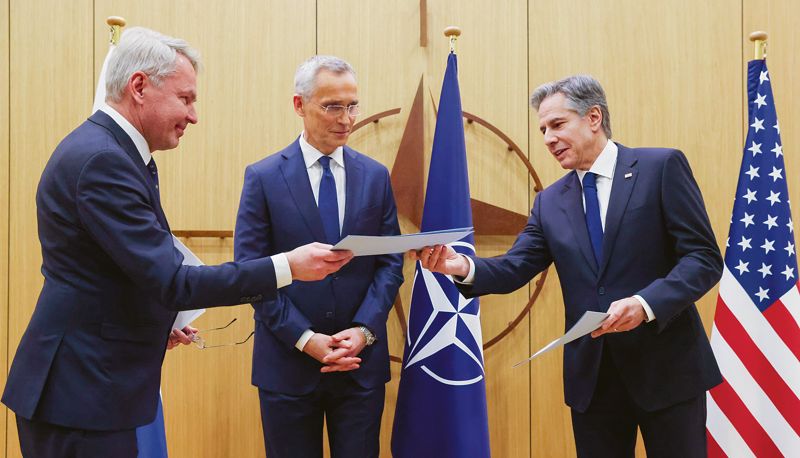

The US-led NATO has 31 members with Finland’s entry to the club. The European Union (EU) has 27 member nations. Both are headquartered in Belgium, historically known as the ‘cockpit of Europe’, owing to the high number of battles fought on its soil. The Group of Seven (G7), however, is more powerful, consisting of leading industrialised countries which meet informally at the level of heads of state or government; the presidents of the European Council and the European Commission represent the EU.
The West realises well that today, it cannot physically fight Napoleonic or Hitlerian wars in its own backyard. Contemporary Europe faces twin debilitating factors: ‘slowest (mostly minus) growing population’ in 28 nations and lowest fertility rate in 22 countries. The West can be physically present only inside Ukraine. It’s bizarre because direct military action by the West is impossible for one reason or another; nay, both the rapid demographic devastation and the irreversible economic damage.
Together, all three groups reveal Western supremacy in world economics. These groups are determined to dominate the show — despite the rising Asian challenge — through money power as the days of western nations’ imperial conquest of countries in resource-rich, underdeveloped Asia, Latin America and Africa are a thing of the past.
Yet, the G7 remains a formidable financial power, as seen from the economic parameter of gross domestic product (GDP) from pre-Covid 2019: the US ($21.4 trillion), Japan ($5.08 trillion), Germany ($3.86 trillion), the UK ($2.83 trillion), France ($2.71 trillion), Italy ($2 trillion) and Canada ($1.736 trillion).
Six of the G7 member states are from the Occident, while Japan represents the Orient. Regrettably, this ‘all-powerful Club Seven’ is actively considering imposing a near-total ban on exports to Russia amid the Ukraine war, thereby potentially sowing the seeds of monstrous mayhem.
Unfortunately, ever since the outbreak of the Russia-Ukraine conflict 14 months ago, there has never been any serious/sincere effort from the NATO, the EU or the G7 to prevail upon the warring nations to cease hostilities.
The sad part of the unfolding story, therefore, is that the West seems hell-bent on strangling Moscow through penury and starvation to a slow, painful destruction. By doing so, the G7 seems to be ignoring the fundamental principle of behavioural psychology since the dawn of human history. If pushed to the wall without an escape route for survival, a suicidal counter-attack is the inevitable outcome, thereby resulting in mutually assured destruction (MAD).
The West seems to be keen on prolonging the macabre dance of death and destruction, inflicting colossal damage on itself.
The West must remember that both the much-publicised proposed economic/financial ‘sanctions’ imposed by the G7 to cripple the adversary and the stamina as well as endurance of the sanctioned nation have shelf lives as they depend on who blinks first or who outruns the other, and when.
Let’s take a few examples from history to visualise as to what could be the way to surviving or thriving. In the 431-404 BC Peloponnesian War fought between Athens and Sparta, ‘a trade boycott imposed by Athens on Sparta’s ally Megara’ led to the 27-year-long war, resulting in much misery and ruin, according to great chronicler Thucydides.
In modern times, the then US President Woodrow Wilson, perhaps, was the earliest to recognise sanctions as a “peaceful, silent, deadly remedy” to fix an adversary as “there will be no need for force.”
In less than 23 years, Wilson’s successors, despite imposing a fuel and steel embargo on Japan, provoked Tokyo to launch a deadly pre-emptive strike on the US, thereby escalating and transforming a European war into World War II. Sanctions have proved to be good in theory but bad in practice. Sanctions don’t necessarily restrict or nip a war in the bud because every living species is bound to counter-attack when death is imminent and inevitable. The law of nature stands ‘as is where is’ since time immemorial.
One just has to visualise the world’s battlefields to understand how ferocious hand-to-hand fights or ‘death-wish’ combatants are a part of a nation’s folklore.
Hence, the bottom line of conventional war even today, like the Russia-Ukraine conflict, is the death of countless soldiers. No nation can fight a long-drawn land war without an inexhaustible supply of able-bodied men awaiting their turn for the grave. The death zone is a frightening prospect for the wealthy nations, especially the West, which started it and got a taste of their aggression in the two wars of the 20th century and are now petrified to see the scale of fatality in mainland Europe.
The West realises well that today, it cannot physically fight Napoleonic or Hitlerian wars in its own backyard. Contemporary Europe faces twin debilitating factors: “slowest (mostly minus) growing population” in 28 nations and lowest fertility rate in 22 countries. The West can be physically present only inside Ukraine. It’s bizarre because direct military action by the West is impossible for one reason or another; nay, both the rapid demographic devastation and the irreversible economic damage.
Hence, when “doing nothing” is likely to be seen as complicity, “something’s to be done to express morality of solidarity”, something that at least sends a clear signal to the world that what the alleged aggressor is doing has the disapproval of the mighty G7, EU and NATO.
Sanctions, therefore, are the first as well as the last resort, not physical participation, to help Ukraine. Today, Ukraine’s condition is like that of Poland, Bohemia, Moravia and Slovakia before and during World War II.
It’s NATO (no action, talk only) for Ukraine. Arms to Ukraine, sanctions against Russia — both strategies have been in vain so far.
